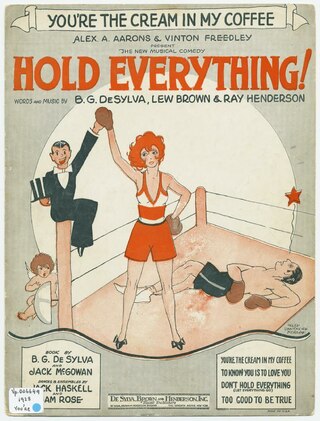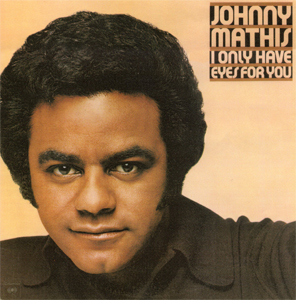
Carmen Lombardo was lead saxophonist and featured vocalist for his brother Guy Lombardo's orchestra. He was also a successful composer. In 1927, Carmen Lombardo was the vocalist of the hit record Charmaine, performed by Guy Lombardo and His Royal Canadians.
"'A' You're Adorable" is a popular song with music by Sid Lippman and lyrics by Buddy Kaye and Fred Wise, published in 1948.
"Playmates" is a popular song ostensibly written by Saxie Dowell. The main theme was note-for-note plagiarized from the 1904 intermezzo "Iola" by Charles L. Johnson, for which Johnson sued, settling out of court for an undisclosed sum.
"It's Magic" is a popular song written by Jule Styne, with lyrics by Sammy Cahn, published in 1947. They wrote the song for Doris Day in her Warner Brothers film debut, Romance on the High Seas. In the autumn of 1948 Vic Damone, Tony Martin, Dick Haymes, Gordon MacRae and Sarah Vaughan all charted on Billboard magazine charts with versions of the song, but none as successfully as Day's recording. "It's Magic" received an Academy Award nomination for Best Song, but in March 1949 lost to "Buttons and Bows" by Jay Livingston and Ray Evans.
"Goody Goody" is a 1936 popular song composed by Matty Malneck, with lyrics by Johnny Mercer. First recording of the song was by Ted Wallace and His Swing Kings [Bluebird, B-6252-B, 1936]. The song is referenced several times in the 1936 Kaufman and Hart play "You Can't Take It With You". Popular recordings in 1936 were by Benny Goodman and his Orchestra, Freddy Martin & His Orchestra, and by Bob Crosby & His Orchestra.

"Moonlight Bay" is a popular song. It is commonly referred to as "On Moonlight Bay". The lyrics were written by Edward Madden, the music by Percy Wenrich, and was published in 1912. It is often sung in a barbershop quartet style. Early successful recordings in 1912 were by the American Quartet and by Dolly Connolly.
"Pennies from Heaven" is a 1936 American popular song with music by Arthur Johnston and lyrics by Johnny Burke. It was introduced by Bing Crosby with Georgie Stoll and his Orchestra in the 1936 film of the same name.

"You're the Cream in My Coffee" is a popular song published in 1928. Hit recordings were by Annette Hanshaw, Ben Selvin, Ted Weems and Ruth Etting.

"I'll Get By (As Long as I Have You)" is a popular song with music by Fred E. Ahlert and lyrics by Roy Turk that was published in 1928. Versions by Nick Lucas, Aileen Stanley and, most successfully, Ruth Etting, all charted in America in 1929.
This is a list of notable events in country music that took place in the year 1937.
"I've Got My Love to Keep Me Warm" is a popular song copyrighted in 1937 by its composer, Irving Berlin, and first recorded by (i) Ray Noble, Howard Barrie, vocalist; (ii) Red Norvo, Mildred Bailey, vocalist; (iii) and Billie Holiday with her orchestra. The song – sung by Dick Powell and Alice Faye – debuted on film February 12, 1937, in the musical, On the Avenue.

"That's My Weakness Now" is a song written by Sam H. Stept and Bud Green in 1928. This became their first hit song together, having been made popular by singer Helen Kane that same year. Another recording in 1928 was by Paul Whiteman and his Orchestra, supported by a vocal group including Bing Crosby.

"Mean to Me" is a popular song with music by Fred E. Ahlert and lyrics by Roy Turk, published in 1929. Hit versions that year were by Ruth Etting and by Helen Morgan. Ben Bernie and the Hotel Roosevelt Orchestra also recorded what might be the first male version in February 1929 with vocals by Scrappy Albert.
"I Can't Get Started", also known as "I Can't Get Started with You" or "I Can't Get Started (With You)", is a popular song. It was written in 1936 by Vernon Duke (music) and Ira Gershwin (lyrics) and introduced that year in the revue Ziegfeld Follies of 1936, where it was performed by Bob Hope and Eve Arden.
"42nd Street" is the title song from the 1933 Warner Bros. backstage musical film 42nd Street, with music by Harry Warren and lyrics by Al Dubin. The song was published in 1932. It is the finale of the film, where it was sung by Ruby Keeler, Dick Powell and ensemble. It was used again in 1980 when the film was adapted as a long-running Broadway musical. In 2004 the song placed #97 in AFI's 100 Years...100 Songs survey of the top tunes in American cinema.

"Right or Wrong" is a jazz ballad from 1921. Composed by Arthur Sizemore and Paul Biese, with words by Haven Gillespie, it is described by the original sheet music as "a beautiful fox-trot ballad."

"Every Day I Have the Blues" is a blues song that has been performed in a variety of styles. An early version of the song is attributed to Pinetop Sparks and his brother Milton. It was first performed in the taverns of St. Louis by the Sparks brothers and was recorded July 28, 1935 by Pinetop with Henry Townsend on guitar. The song is a twelve-bar blues that features Pinetop's piano and falsetto vocal. The opening verse includes the line "Every day, every day I have the blues".

I Only Have Eyes for You is an album by American pop singer Johnny Mathis that was released on May 10, 1976, by Columbia Records and included two new songs, "Yellow Roses on Her Gown" and "Ooh What We Do", which was written specifically for him, as well as a contemporary arrangement of the 1934 title track that foreshadowed his recordings of standards that incorporated a disco beat a few years later.
"Love Is the Sweetest Thing" is a popular song written in 1932 by British band leader and singer Ray Noble. Using guest vocalist Al Bowlly, Noble's recording was a big hit on both sides of the Atlantic, bringing Noble his first American success. It was published by Francis, Day & Hunter Ltd. Like most compositions published in the period, its main refrain is preceded with what were then called "sectional verses" or "introductory verses" which are usually omitted from early recordings and modern performances.
"This Year's Kisses" is a popular song written in 1936 by Irving Berlin for the musical film On the Avenue (1937) and introduced by Alice Faye. Popular recordings in 1937 were by Benny Goodman, Hal Kemp, Shep Fields and by Teddy Wilson with Billie Holiday.








